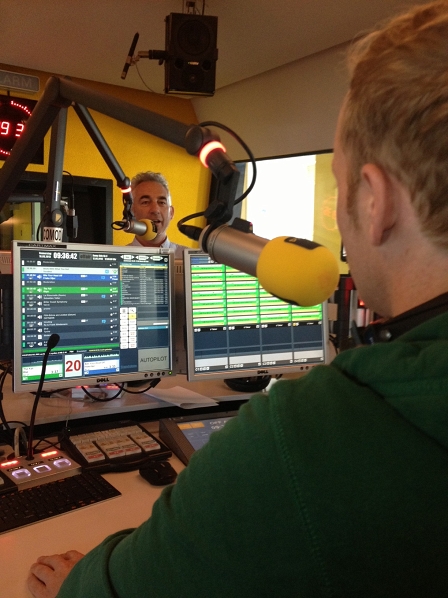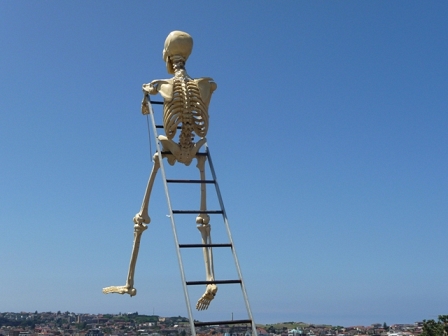Erstellt am: 16. 5. 2013 - 14:56 Uhr
Too Much Stuff, Too Little Time
What do we need to live happy, dignified lives? Tim Jackson, ecologist, alternative economist and author of the much-discussed book Prosperity Without Growth says we need more time, a greater sense of community and less junk.
- Barbara Köppel met Polly Higgins at the Erdgespräche and talked with her about "ecocide" gesprochen.
The economy has trapped us in a destructive cycle of consumption that is counterintuitive, says Jackson, who is one of the guest speakers at tonight’s Erdgespräche: “People themselves don`t necessarily want to be spending money they haven`t got on things they don`t need, to create impressions that won`t last on people they don`t care about.”

M.P. Hempt
When the financial crisis first hit back in 2008, says Jackson, most people`s instinct was to slow down and concentrate more on necessity than luxury. That seemed logical but didn’t make economic sense: the reduction in consumer spending made the economy worse therefore leading to job losses. So is our economic model illogical? Well, Jackson says it has outlived its use:
“We`re caught in a trap, our politicians are caught in a trap,” he says, “We thought our economy would work if we could just grow it for ever, if you could just have more stuff. And in the beginning it worked because we needed more stuff. But actually in the richest economies now we have a surfeit of stuff and too little time.”
Jackson says that we live “rushed, hurried, harried” lives which don`t give us time to enjoy all the things we have bought. He thinks slowing down a bit would ease our “sense of anxiety.”
This made me think of my days as a counsellor at an expensive children`s summer camp in North Carolina. I felt I was working with kids who were miserable because they’d been dumped for the entire summer by their wealthy but overworked parents. What sort of a society is that?
Austerity vs Stimulus - the wrong question?
Growth is a mantra in European politics – the holy grail in terms of tackling the continent`s crippling, dignity-robbing curse of unemployment. The questions asked focus on how to kick-start that growth, with the left- and right-wing leaders of Europe locked in the austerity versus stimulus debate. But are they asking the right questions?
“This growth-equals-jobs thing is just wrong,” says Jackson. “It only makes sense if you keep chasing labour and productivity, which means everyone has to work harder and harder all the time. It means squeezing more out of each person all the time. Of course if you are doing that then you do need growth, but at the same time it makes our jobs crap, it makes our lives unworthwhile.”

EPA/ORESTIS PANAGIOTOU
When Jackson first started voicing his theories he was often dismissed as a dreamy idealist but his ideas are now being taken more seriously since the financial crisis has revealed the great paradoxes of our current economic model. But what does prosperity mean to the man who believed it can be achieved without growth?
“It means having decent housing, good quality food, and decent clothes to wear. That is a part of it. There is no denying there is a very material component. But that is not all there is. Every ordinary person on the street recognises that prosperity is as much about social things, such as our friends or families and our communities. It is about having meaningful work that we enjoy. It`s about being a decent person.”
Addicted to Junk
In his book Jackson writes that “the profit motive stimulates a continual search for newer, better or cheaper products and services. Our own relentless search for novelty and social status locks us into an iron cage of consumerism. Affluence has itself betrayed us."
Certainly in the West most of us have more than we need – and I freely admit to cycling in for the interview listening to my mp3 player and checking the time on my smart phone. Jackson sees most consumer goods as status symbols, he believes we are desperate to impress and find common ground with our peers – we want to feel accepted and valued. But we don`t need goods for that.
“At the end of the day it is not that satisfying to have things. It is more satisfying to do things with friends. You don`t have to prove yourself with the things you own.”
"We`re not that selffish!"
So in Jackson`s view we are constantly on the look out for a meaningful existence and a place in a community. Isn`t this an overly romantic version of humanity? We like to take what we can get for ourselves and always have.
“Of course we are selfish, of course we`re like kids in the candy shop,” admits Jackson. “Of course we can`t get enough of it when you throw it in our faces all the time and tell us that is what life is all about. But no human being is entirely selfish. We all care about our friends and families. We all have concerns that go beyond just me, me, me all the time. The only people who don`t recognise this are the economists who have created an economy that is all growth, selfishness and materialism. That economy is wrong.”

chris cummins
A big failure of the current system is obviously its failure to factor in the needs of nature. We live on a planet of finite resources and so the concept of infinite growth in nonsensical. The West already consumes much more than nature can reproduce and as the developing world rapidly catches up and aspires to Western standards of living, the natural world looks bound to collapse, followed inevitably by economic ruin – trying holding your breath as you count your money, as they say. Jackson calculates that we would need to make a 135-fold increase in carbon efficiency by 2050 if we were to unite growth with keeping climate change under control. So we certainly need a rethink.
What would Jackson`s alternative economy look like? He says we have to build different kinds of enterprises and think differently about employment and investment. Predictably he mentions bolstering green energy but adds this should be done on a local level: “people greening their own communities and getting a return on their savings.” But Jackson, who served as economics commissioner on the British government's Sustainable Development Commission, says investment should be in any business that improves the quality of our lives. from health facilities to the arts.
Dieses Element ist nicht mehr verfügbar
Perhaps Jackson`s diagnosis of what is wrong is more convincing than his recipe for setting it right, which sounds pleasant but rather vague. We can`t all be doctors and solar technicians, after all. And even if the figures added up, how could such alternative models be implemented? Who chooses what improves the quality of our lives for the masses? Karl Marx recognised that the labour system was unfair, but attempts to put his fairly benevolent and surely well-meaning ideas into practice resulted in coercion and forced indoctrination. The law-of- the-jungle system of capitalism has at least been relatively liberal with many of us choosing different paths to our own individual definition of happiness.

chris cummins
“To be honest I don`t know how it is going to be implemented but I know we have to implement it. The path that we are on is collapsing even on its own terms – all attempts to kick-start the European economy are failing. It is not about revolution, it is not about Marxism, it is not about radical green. It is about practical politics. It is about the economy of tomorrow.”


